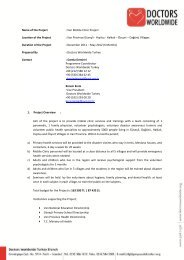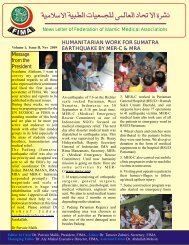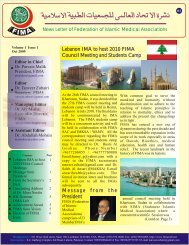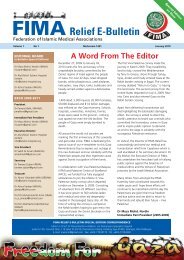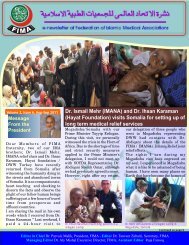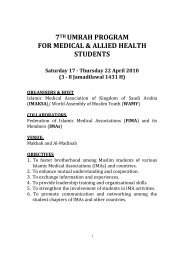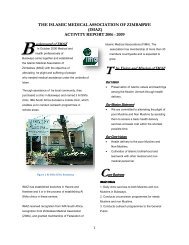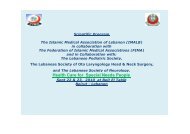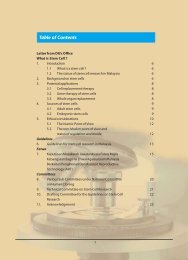FIMA Year Book 2009 - Federation of Islamic Medical Associations
FIMA Year Book 2009 - Federation of Islamic Medical Associations
FIMA Year Book 2009 - Federation of Islamic Medical Associations
You also want an ePaper? Increase the reach of your titles
YUMPU automatically turns print PDFs into web optimized ePapers that Google loves.
Clinicians As Effective Researcherspr<strong>of</strong>essional medical conduct in NewYork, it became apparent to me thatphysicians are not immune to ethicallapses. This becomes even moreimportant in research where patientsare entrusting the physicians to beingtested with an unproven, <strong>of</strong>ten notapproved, medication or device. Twopersonal examples will highlight this.a) I did sizable clinical research in theapplication <strong>of</strong> fluoroquinolones inrespiratory tract infections. Asour team published and presentedour findings in pr<strong>of</strong>essionalmeetings, I began to receiverequests from several differentpharmaceutical companies to testtheir brand <strong>of</strong> fluoroquinolones.One such product had obviousneurologic complications, everythird or fourth <strong>of</strong> my enrolledpatients had some evidence <strong>of</strong>neurologic stimulation: irritability,sleeplessness, and even seizures. Ifelt exposing my patients to suchside effects was not appropriateand quickly informed my IRB thatI was canceling the study.b) While studying Cipr<strong>of</strong>loxacin,which had been showing excellentclinical results (8) one <strong>of</strong> ourenrolled patients had a grandmal seizure, which she neverhad before. After careful clinicalinvestigation, we determined it wasmost likely the result <strong>of</strong> a very highblood theophylline level resultingfrom the interaction between theCipr<strong>of</strong>loxacin and theophylline.Up to that time, Cipr<strong>of</strong>loxacinhad not been known to increasethe blood theophylline level. Thesponsoring company was quicklyadvised <strong>of</strong> this complication, and,to its credit, it encouraged us tostudy this interaction in greaterdetail, which we did and thusestablished the Cipro-theophyllineinteraction. (9)The point <strong>of</strong> these two examples is thatbecause complications can occur whiledoing research, it is the investigators’responsibility and moral/ethical dutyto weigh the risk/benefit ratio carefully,keeping the patients’ interest and wellbeinguppermost in mind.Dr. Stephen E. Straus is a highlyrespected researcher at the NIH.He was the principal researcher in aresearch study on a new investigationaldrug for the treatment <strong>of</strong> hepatitis.Five patients he treated at the NIHhospital in Bethesda, Maryland,died, which led to news reports andcongressional hearings. The studywas discontinued, and eventually heand his colleagues were cleared <strong>of</strong>any wrongdoing. Later on they foundout that the investigational drugwas a mitochondrial poison leadingto severe metabolic acidosis. Strausregularly presents this incident atthe annual NIH course on research.Understanding the importance <strong>of</strong>unanticipated risks in clinical researchis highly recommended for all who doclinical research. (10)<strong>FIMA</strong> <strong>Year</strong><strong>Book</strong> <strong>2009</strong>133




